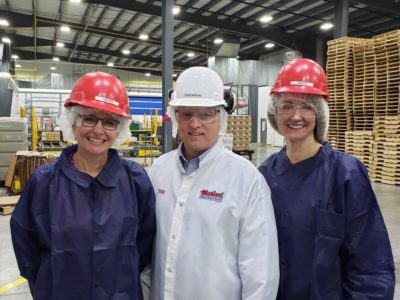
It’s a familiar story – a small Midwestern town loses a major manufacturing employer, leading to high unemployment and disruptions to the local economy. This was the case in Wisconsin Rapids, which had been the headquarters of Consolidated Papers, making Wisconsin Rapids the smallest city in the United States to be home to a Fortune 500 company. But rising wood pulp costs and foreign competition led to the industry’s decline and the paper manufacturer went through a series of acquisitions, cost-cutting measures, and layoffs. By 2010, the town had lost 35% of its manufacturing jobs.
The Problem
Then in 2011, Mariani Packing company purchased a cranberry plant in Wisconsin Rapids. Because Wisconsin is responsible for 60% of domestic cranberry production, Wisconsin Rapids was an ideal location for this leading producer and distributor of dried fruit. In 2017, Mariani planned for expansion and set a goal to increase their workforce by 30%. Given central Wisconsin’s extremely tight labor market, where a growing economy and an aging population created fierce competition for a limited pool of workers, Mariani’s leaders knew this would be a challenge. Employers in the region experienced high turnover, and Mariani was no exception.
As part of a National Fund job quality initiative, Mariani partnered with the Incourage Community Foundation (at the time part of the National Fund’s network) and set off on a job design journey to better attract and retain workers for the coming expansion. The company’s efforts were documented in a recent case study.
The National Fund adopts a dynamic definition of a quality job. For employers, improving the quality of jobs is a menu, not a mandate. Our job design framework offers a menu of job quality components that come together in different ways depending on the context. The components are classified as foundational, support, and opportunity. The foundational pillar includes the most basic elements of a job; such as wages, benefits, and safety. The support pillar expands upon these basic elements to include assistance that helps employees perform their job well and achieve stability outside of the workplace, e.g., supervisor training and financial counseling. Finally, the opportunity pillar focuses on employee career advancement and personal development.
Mariani selected a variety of job quality improvements from across all three pillars, as shown in the table below.
| FOUNDATIONAL | SUPPORT | OPPORTUNITY |
| Increased entry-level wages | On-the-job training | Activities and incentives to build team cohesion and community |
| Skill-based financial incentives | Mentoring relationship between the department trainer and new employees | New training manager role to support employee development and build community |
| Clear career advancement ladder |
What They Did
Technical and middle management jobs presented the biggest concern. Even though all openings were posted internally first, Mariani struggled to receive enough internal applications for midlevel positions. Through an analysis of its workforce practices and challenges, Mariani learned that its ratio of frontline workers to shift supervisor was high for the industry. And in fact, many employees were interested in advancing their careers, but they assumed the only path to advancement was to wait for someone else to leave.
“The only way for me to move up in this company would be for my supervisor to leave. And I really like my supervisor!” – Mariani employee
Mariani’s leadership realized the need to make the company’s internal career ladder clearer. They knew their own employees were the best source of talent in Wisconsin Rapids’ tight labor market, so they introduced a new mid-level role in production and packaging lines: the department trainer. The department trainer receives a modest raise and has increased responsibility to onboard new employees – an important role for a company actively growing its workforce. Line leads are tasked with identifying and encouraging potential applicants, and to Mariani’s surprise, they filled the positions easily.
The department trainers are central in coaching new employees. New employees now spend their second week of orientation on a production or packaging line with a trainer. This creates a valuable mentoring relationship, which makes the department trainer role more meaningful and helps new employees become better acclimated to the job.
The new department trainer role has been a success – after 18 months, ten trainers were promoted to department leads or other advanced positions. Realizing the value of investing in their workforce, Mariani also increased entry-level wages to better compete for entry-level workers and created a new skill-based incentive program. Operators can now advance through three levels (which qualifies for raises) through a managerial assessment based on objective criteria.
These successful changes also motivated Mariani to address company culture. They hired a training manager to implement a variety of projects to support employee development and build a sense of community. The new manager conducted employee interviews to learn about their career aspirations and developed a learning library of resources for employees looking to develop new skills. Because shift work makes it challenging to build relationships among employees, Mariani’s HR specialist designed activities and incentives to bring people together outside of work, including company cookouts, volunteer days, group outings, raffle prizes for meeting certain goals, and more.
A year later, Mariani reached its expansion goal and increased retention by 5%. By redesigning and improving the quality of jobs, and putting employee engagement and communication at the center of the process, Mariani simultaneously addressed a business need and improved outcomes for their employees. Mariani’s success proves that tackling job quality is a smart move for small and mid-sized businesses. While it is often assumed that SMB’s can’t afford them, job quality investments actually provide returns by improving recruitment, retention, operations, and employee well-being.





